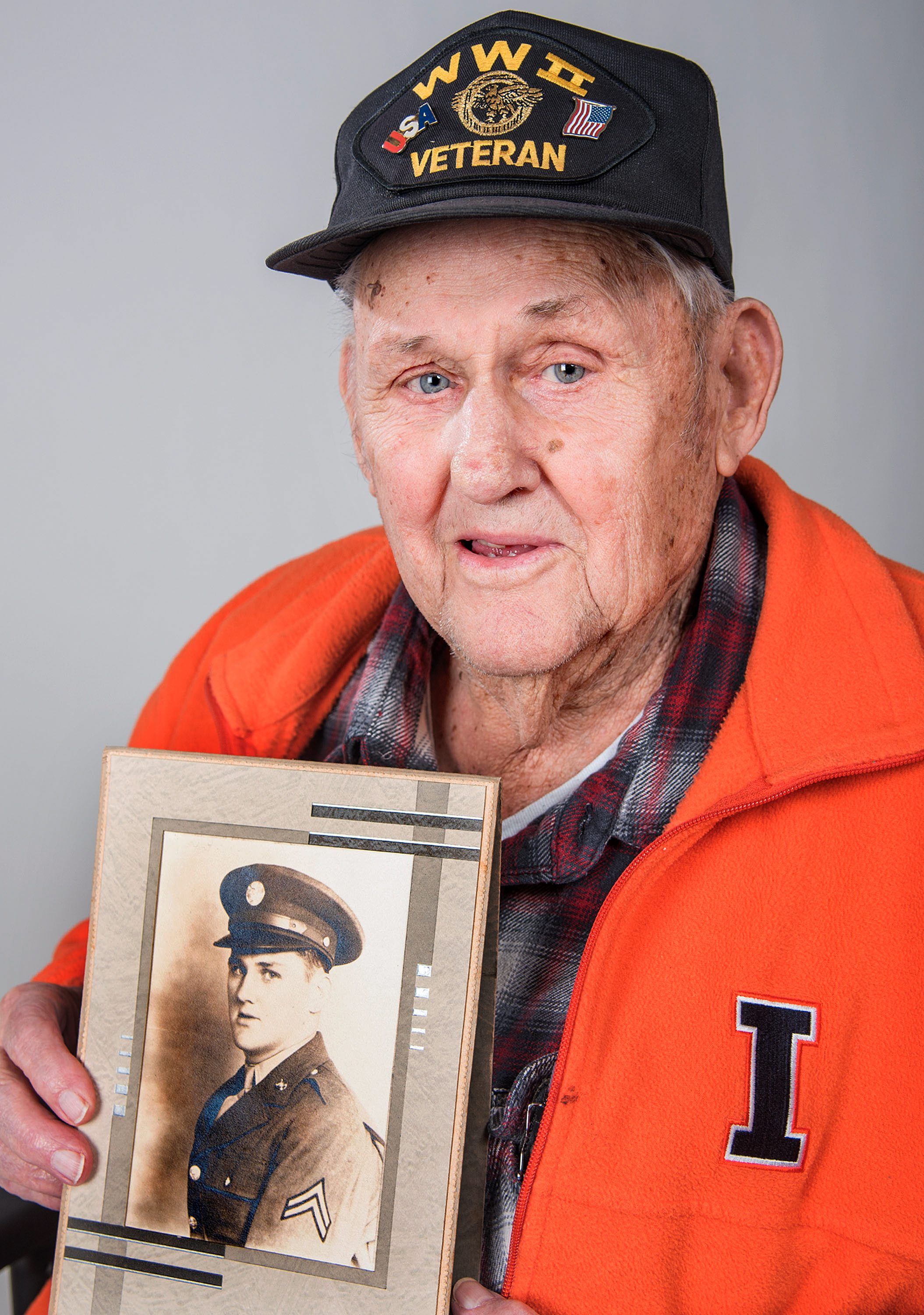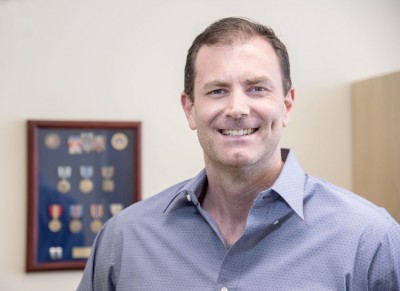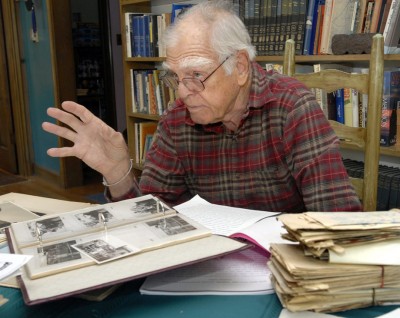Robert Collins
By Paul Wood

Photo By Heather Coit/The News-Gazette
FARMER CITY — Robert Collins served in Africa and invaded Sicily, then and southern France.
He then had to fight his way into to Germany, where his unit helped liberate Dachau, the infamous concentration camp near Munich.
Less than a year after the U.S. entered World War II, Collins, 94, originally from Thomasboro, enlisted in the Army on Aug. 11, 1942.
He had graduated from Rantoul High School, where he played basketball and football when he didn’t have to milk 15 cows.
In his long war service, he was under attack from Luftwaffe bombs and Germans who shot a mess kit out of a buddy’s hands.
“I stayed away from medals,” he says, but still earned the Bronze Battle Star on his campaign ribbon, and four overseas bars.
Collins, who lives between Bellflower and Farmer City, is modest about his honors.
“I got them for shooting at somebody,” he says. “If I did that in the United States, they’d be arresting me.”
Collins was with Headquarters Battery 214 Gun Battalion, and served some time as a radio operator.
His unit arrived in Oran, Algeria, on May 11, 1943. It was July 11 before his unit fired on enemy aircraft, he says.
To prepare for the invasion of Sicily, the men had to waterproof the trucks by putting putty around the spark plugs and wiring, and extending the exhausts upward in the expectations of four feet of water.
A week later, they sailed to Sicily, then took a night convoy to Palermo. The unit shot down 15 enemy aircraft that night, he says.
After the Italian surrender — commanding Gen. Dwight D. Eisenhower flew by, Collins recalls — Corsica was the next stop for his artillery unit.
He recalls in January 1942 a “terrifying storm” at sea in which the ship lost its radio, and they were believed lost at sea.
As the weather grew warmer, mosquitoes feasted. Collins got malaria.
“The pills I took made you yellower than a pumpkin,” he recalls.
His hospital was a tent. He spent a week there.
August brought him onto a landing ship tank headed for southern France a month after D-Day — but the LST hit an obstruction, dumping trucks and guns and breaking a soldier’s leg.
The upside? Collins and his buddies got to stay a week at the Duke of Windsor’s summer home.
In October, they were at the front lines. Collins recalls setting up radar 1,500 feet from the enemy lines.
“The radar was fixed so it picked up steel helmets,” he says. After troops opened up the Germans, they were only one helmet off their count, he says.
He wasn’t sent to the Battle of the Bulge like others in his unit.
“The men that went never came back to our outfit,” he says.
But Jan. 1, 1945, brought an attack on his outfit, his logbook notes. Some Americans were taken prisoner, but almost immediately freed by their own troops.
They crossed the Rhine on temporary bridges.
In Germany, April brought the most horrific event of his service: Dachau.
“We saw 52 boxcars of people that were not cremated yet,” he recalls.
Weeks later, he was feeding German refugees. He said the Germans had hated Hitler — but were too afraid to fight back or speak out.
“They treated us well,” he says.
Collins stayed in the Army several months after the war in Europe ended, returning to Rantoul in October.
A farm was waiting for him, and soon a family.
His wife has died. They had three children.
Do you know a veteran who could share a story about military service? Contact staff writer Paul Wood at pwood@news-gazette.com.
Read more stories from local veterans:
 Nicholas Osborne
URBANA — Lt. Nicholas Osborne served an 11-month deployment during Operation Iraqi Freedom before becoming director of t …
Nicholas Osborne
URBANA — Lt. Nicholas Osborne served an 11-month deployment during Operation Iraqi Freedom before becoming director of t …
 Ralph Langenheim
URBANA — A D-Day veteran calls his own service in World War II “small potatoes.” Fresh out of geological engineering sch …
Ralph Langenheim
URBANA — A D-Day veteran calls his own service in World War II “small potatoes.” Fresh out of geological engineering sch …
 Franklin Longfellow
CHAMPAIGN — When Franklin “Frank” Longfellow returned from Vietnam, his entire welcoming party was two students from Cen …
Franklin Longfellow
CHAMPAIGN — When Franklin “Frank” Longfellow returned from Vietnam, his entire welcoming party was two students from Cen …